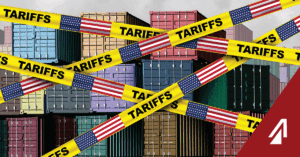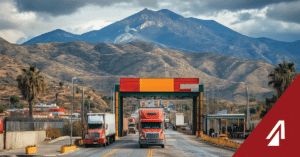Today, we are bringing two topics to your attention as we know that timely information can help identify and resolve issues quickly. The first topic is the upcoming annual CVSA International Roadcheck. Learn more about the targeted focus areas for 2024 and tips for preparing for the roadchecks. If your supply chain involves freight in and out of Canada, particularly by rail, we also want to inform you about a potential labor strike that could start as early as May 22.
CVSA International Roadcheck May 14 – 16
The CVSA International Roadcheck is an annual event conducted by the Commercial Vehicle Safety Alliance (CVSA) in partnership with law enforcement agencies across North America. It’s a three-day roadside inspection program to increase commercial vehicle and driver safety and compliance. During the event, CVSA-certified inspectors conduct compliance and enforcement initiatives targeted at carrier, vehicle, and driver safety. The Roadcheck event also educates the industry and the public about the importance of specific safety topics.
ach annual event emphasizes a category of violations. In 2024, the focus is on tractor protection systems and controlled substance and alcohol possession. According to the CVSA, nearly 15 trucks and motorcoaches are inspected, on average, every minute across North America during the 72-hour Roadcheck event. Inspections occur at DOT checkpoints, including weigh stations, roadsides, and temporary inspection sites.
Inspectors will conduct Level 1 Inspections to verify that the tractor protection system is functioning correctly. They will inspect specific components, such as a vehicle’s brake system, including the tractor protection valve, trailer supply valve, and anti-bleed back valve. Other systems and components inspected to ensure compliance include cargo securement, driveline/driveshaft components, driver’s seat, coupling devices, vehicle frames, fuel and exhaust systems, steering mechanisms, suspensions, lighting devices, tires/wheel/rim/hub conditions, driver’s seat, and windshield wipers.
A vehicle that passes a Level 1 or V inspection without critical violations may receive a CVSA decal, valid for three months. However, vehicles that receive out-of-service violations, as outlined in the North American Standard Out-of-Service Criteria, will be restricted from operation until the violations are adequately addressed.
Inspectors also conduct a driver portion in which they check a driver’s operating credentials, hours-of-service documentation, seat belt usage, and DACH status (U.S. only). As a focus area for this year’s event, inspectors will additionally check for any signs of alcohol and/or substance impairment. Drivers found in violation will be restricted from operating their vehicle.
Tips for Preparing for the 2024 Roadcheck
- Proper vehicle maintenance: Clear communication between safety and maintenance teams and staying on top of preventative maintenance are crucial to ensuring no leaks and maintaining the safety of your vehicles.
- Ensure valid documentation: Verify that drivers are not operating without a valid CDL, registration, insurance documents, driver’s log, proof of annual inspections, motor carrier documentation, shipping papers, and a Hazmat certificate (if applicable).
- Conduct spot inspection: Prepare drivers, particularly new drivers, with the knowledge and clear understanding needed to obtain clean inspections.
- Perform pre-trip inspections: Emphasize the importance of pre-trip inspections before drivers exit the yard and keeping their vehicles neat and clean.
- Invest in technology: GPS technology with asset tracking can often provide advanced engine diagnostic notifications, mileage reporting, and alerts on distance traveled or hours worked.
- Emergency Equipment: Ensure tractors have a charged and secure fire extinguisher and the required emergency equipment.
Potential Labor Strike in Canada as early as May 22
Following months of unsuccessful negotiations, the Customs and Immigration Union and the Public Service Alliance of Canada initiated a nationwide strike hold that started on April 10 and is planned to end on May 15. The Unions submitted their propositions in a hearing on April 10, and representatives from the Treasury Board and Canada Border Services Agency (CBSA) rejected an offer during a Public Interest Commission (PIC) hearing on April 22.
Rail workers are demanding more rest time, as the labor dispute centers on proposed modifications to rest period provisions. The Teamsters Canada Rail Conference (TCRC), representing various rail workers, including train conductors, yard workers, and traffic controllers, argues that the new provisions could jeopardize workplace safety.
If a deal is not reached soon, Teamsters Canada members, representing more than 9,000 rail workers, have authorized strike actions at both major railways, Canadian National Railway Co. (CN) and Canadian Pacific Kansas City (CPKC). The strikes could begin as early as May 22, disrupting the entire North American supply chain from Canada to the Gulf of Mexico. The strike would affect the transport of many goods, from cars, grains, and minerals to coal, fertilizer, and petroleum. It would also interrupt commuter operations.
The CN and CPKC operate about 20,000 miles (about 32186.88 km) of track throughout North America. To avoid the potential for widespread supply chain disruptions, the two sides, though far apart on multiple items, will return to the negotiating table and work with mediators. The goal will be to reach an agreement that is viewed fairly by both sides and does not compromise worker safety.
Our team will continue monitoring these and other events or developments in the global supply chain. Please get in touch with our team if you have any questions or would like additional support in mitigating any risks to your supply chain.
For all your expedite needs, please reach out to our 24/7 Time-Pivotal Expedite Business unit at expedite@protrans.com.



